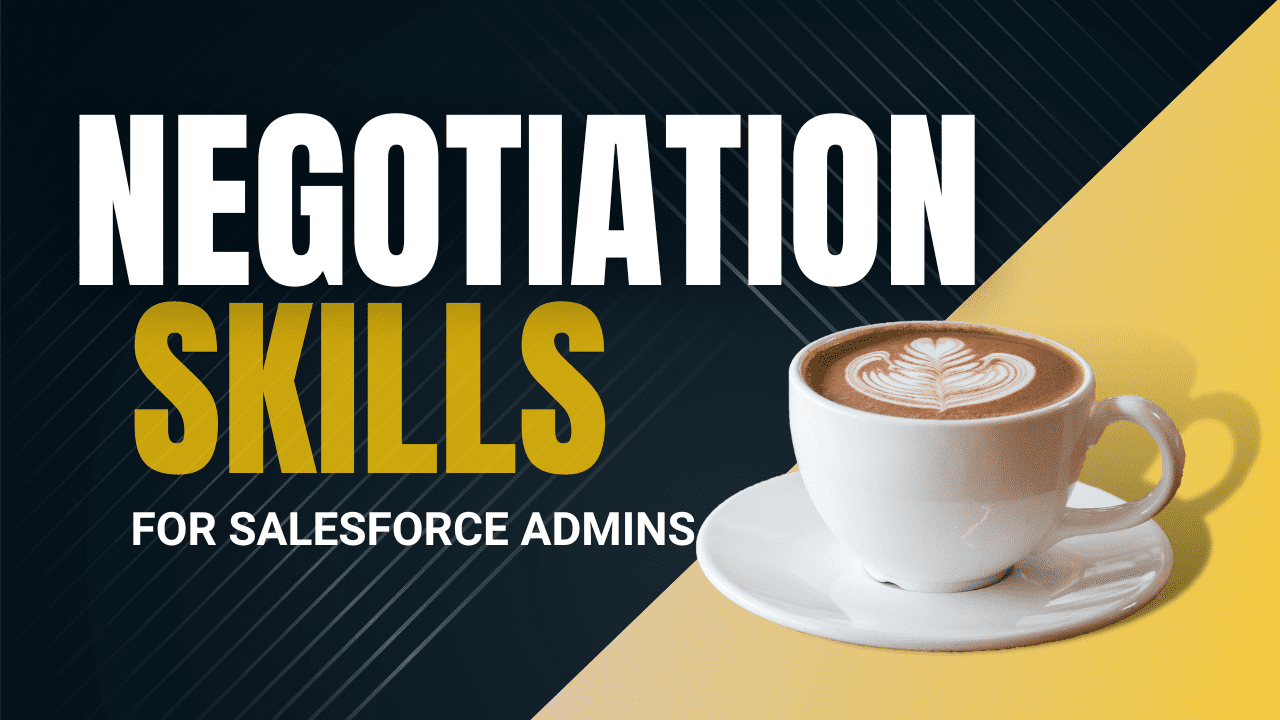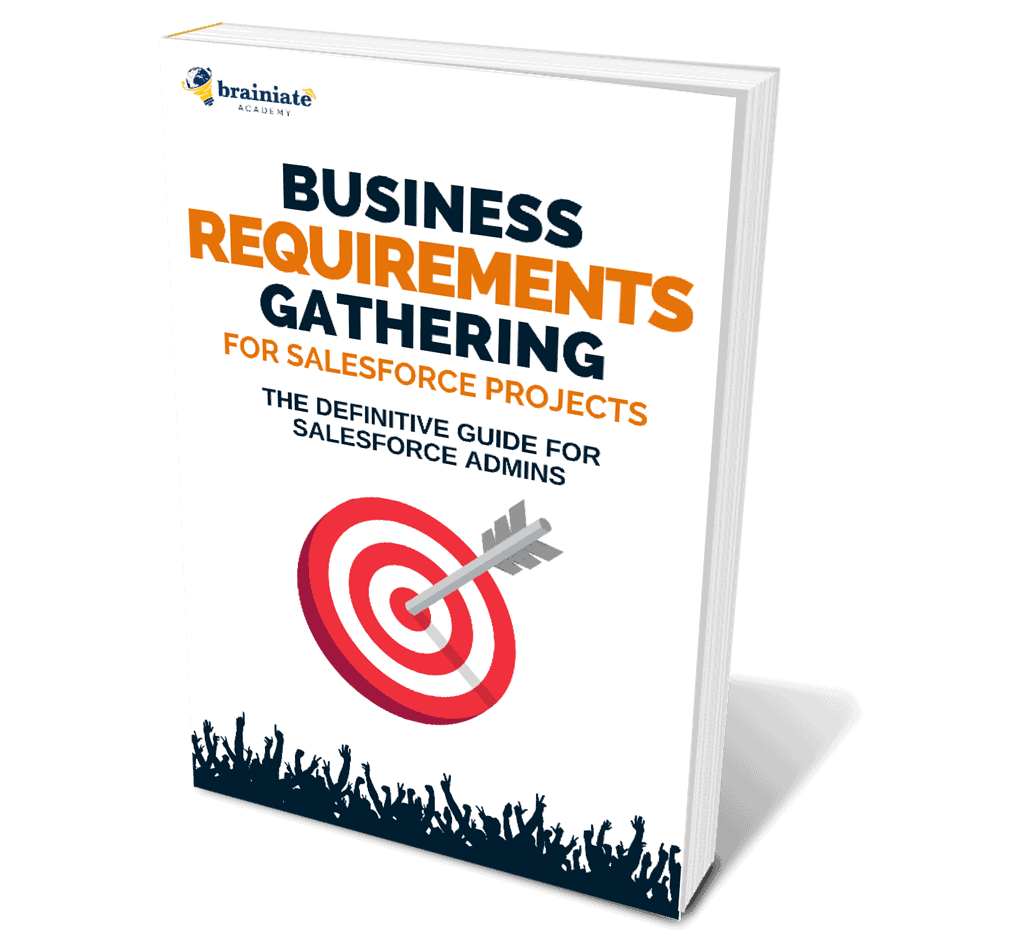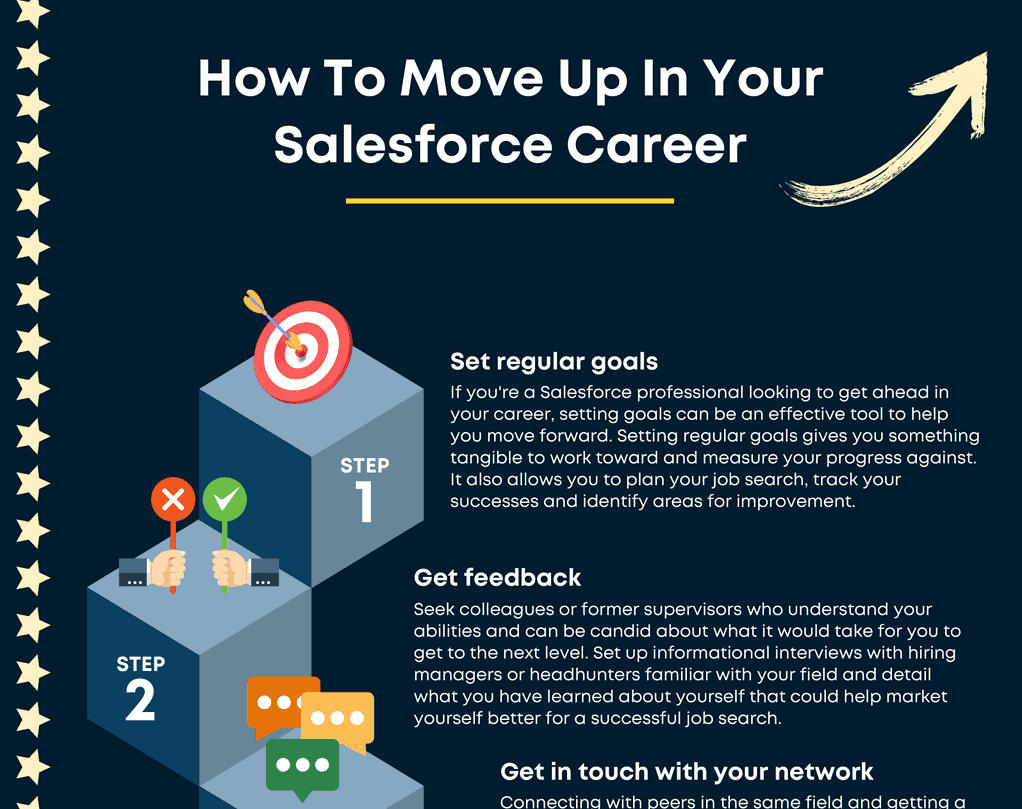Negotiation Skills for Salesforce Admins: A Comprehensive Guide

Introduction
Being a Salesforce Admin without solid negotiation skills is like trying to herd cats. You might have all the right tools and strategies, but if you can’t get people to cooperate and work together, you’ll end up in chaos.
Imagine convincing a group of Sales reps to adopt a new process or tool. Without solid negotiation skills, you’ll be met with resistance and skepticism. It’ll be like trying to convince a toddler to eat their vegetables – you’ll have to bribe, cajole, and plead with them to get them to take a bite.
But with solid negotiation skills, you can turn that skepticism into enthusiasm. You can convince the Sales reps that this new tool or process is in their best interest and will make their jobs easier and more effective. It’ll be like convincing a group of teenagers to go to a party – they’ll be excited and ready to go!
So, if you want to be a successful Salesforce Admin, don’t be like a cat herder. Develop those negotiation skills and get everyone on board!
As a Salesforce Admin, negotiation skills are essential for success in the fast-paced and ever-changing business world. Negotiation skills allow you to communicate effectively, build strong relationships, and achieve your goals in any business setting.
Whether you are negotiating with vendors, clients, or colleagues, having the right negotiation skills can mean the difference between success and failure. This comprehensive guide will provide practical tips, techniques, and strategies to help you become a skilled negotiator and achieve your business goals.
🔥 SUBSCRIBE! 🔥

Get practical Salesforce advice in your inbox!
Feeling overwhelmed by everything you have to do as a Salesforce Admin?
I know how it feels.
I created the FREE Brainiate Newsletter – to help you stay up-to-date with the latest Salesforce news, advice, and product recommendations.
Sign up for my newsletter and get all that information right in your inbox – without having to search for it yourself. You’ll be able to focus on your projects with peace of mind, knowing you’re always up-to-date on the latest Salesforce updates.
Click the button below and sign up for my FREE Brainiate Newsletter today!

The Fundamentals of Negotiation
What Is Negotiation?
Negotiation is a strategic conversation designed to find an agreement between two or more parties. It’s a critical skill that Salesforce Admins must develop to work together effectively with end-users, business leaders, stakeholders, and subject matter experts.
For instance, if a Salesforce Admin needs the approval of a business leader before signing off on a new project, they might use negotiation tactics and strategies to get that approval. Negotiation then becomes a way of finding common ground to move ideas forward. Understanding the other person’s goals, priorities, objectives, and interests can create an outcome that everyone feels good about. At its best, negotiation is about teamwork – doing more together than you could do apart.
Types of Negotiation
Negotiation is an essential skill for Salesforce Admins to master. Understanding the different negotiation types can help them be more effective when engaging with end-users, business leaders, stakeholders, and subject matter experts.
Distributive negotiation is often used when there is a limited or finite pool of resources, such as when working on software implementations or upgrades. In this situation, both parties compete for the same resources, and each wants to “win” the most significant share. As a Salesforce Admin, they must be savvy to secure the best possible outcome. This might involve anticipating what the other party will ask for, understanding their goals and objectives, and finding common ground from which both parties can benefit.
Integrative negotiation occurs when both parties have something to gain by reaching an agreement that works for everyone involved. This could be useful when the Salesforce Admin needs input from multiple stakeholders to make decisions on implementation plans or data migrations. It involves compromising on specific points to reach a consensus that all parties can agree on. It also requires building relationships with those involved and clearly understanding their particular interests and concerns so that solutions can be tailored accordingly.
Overall, Salesforce Admins need to understand both distributive and integrative negotiations to effectively achieve successful outcomes when dealing with external stakeholders with different perspectives and objectives than their own. Mastering these techniques will give them an edge when negotiating complex deals within their organization or industry.
DOWNLOAD YOUR COPY!

The quick-start guide to gathering business requirements
Are you responsible for ensuring Salesforce projects run as smoothly as possible?
With the Business Requirements Gathering for Salesforce Projects: The Definitive Guide for Salesforce Admins, you can quickly get up to speed on the best practices for gathering business requirements.
This comprehensive book, written by Salesforce consultant and trainer David Giller, provides powerful methods and insights to ensure your projects are successful.
The Five Stages of Negotiation
Negotiation is integral to practically any business process, especially for Salesforce Admins. Knowing the five stages of negotiation can help Salesforce Admins to navigate better complex conversations with end-users, business leaders, stakeholders, and subject matter experts.
Preparation:
The first stage of negotiation is preparation. Before engaging in a negotiation, a Salesforce Admin must take the time to understand their objectives, research the other party to gain leverage, and develop a strategy. This step can be particularly critical when dealing with end-users or stakeholders with different interests than the Salesforce Admin.
Opening:
The second stage is opening. At this point, the goal should be to set the tone for the negotiations by presenting one’s position or asking questions to understand the other party’s position. This is especially important when communicating with business leaders or subject matter experts since it will shape how negotiations progress.
Bargaining:
The third stage is bargaining. During this phase, offers are exchanged, and counteroffers are made until both parties agree on terms and conditions. For Salesforce Admins, it’s important to remain level-headed during this stage; emotions must be kept in check while ensuring that all parties involved stay focused on achieving their goals without sacrificing values.
Closing:
The fourth stage is closing. Once an agreement has been reached and both parties are satisfied, it’s time to finalize it by signing contracts or other documents. As a Salesforce Admin, strong analytical skills can help ensure that all parties involved get what they want from the negotiation process without compromising on ethical standards.
Implementation:
Finally comes implementation – ensuring that both parties honor their commitments once the negotiation process has concluded so as not to disrupt existing relationships or jeopardize future trust. It is also up to Salesforce Admins to ensure that they follow through on agreed-upon action items within a given timeline to ensure that no misunderstandings occur afterward due to a lack of follow-through from either side.
The Art of Negotiation
Key Negotiation Skills
To be a successful negotiator, you need to have the following essential negotiation skills:
1. Active Listening:
As a Salesforce Admin, being an active listener when negotiating with stakeholders is crucial. Engaging and understanding their needs will enable you to get the best results for both parties. When a stakeholder speaks, listen attentively and focus on understanding their points to come up with the best solution.
2. Effective Communication:
Besides being a good listener, you must communicate effectively when negotiating with stakeholders. Be clear and direct in your language while expressing yourself thoughtfully and professionally. Ensure your message is easily understood so both parties can reach an agreement quickly and effectively.
3. Emotional Intelligence:
Negotiation often involves working with people with varying emotions or enthusiasm about a particular issue, especially for Salesforce Admins, whose job requires them to interface with different teams daily. Having emotional intelligence means being able to read these emotions accurately and managing them safely to create productive conversations that result in positive outcomes for all parties involved.
4. Creativity:
Negotiating often requires creative solutions that satisfy all sides involved, especially when working with different teams or subject matter experts, as Salesforce Admins regularly do. Tap into your creative side by considering unorthodox options or alternative perspectives that could yield better outcomes than traditional ones would offer.
5. Flexibility:
Flexibility during negotiations is essential for successful outcomes as a Salesforce Admin since many variables constantly change depending on the situation – such as customer demands, business objectives, etc. Be open-minded and willing to adjust strategies when discussing key topics such as pricing or timelines to develop suitable alternatives for everyone involved.
6. Strategic Thinking:
As a negotiator, it’s essential to think strategically even before going into a negotiation session – doing research beforehand and considering different scenarios that could take place in the meeting, etc.; this helps ensure that you know what objectives you want to achieve from the start which makes it easier for you suggest beneficial solutions during negotiations without losing sight of your end goal as well as those of other parties involved.
7. Problem-Solving:
As part of a practical negotiation skillset, Salesforce Admins need to be able to problem-solve on their feet, mainly when unexpected issues arise or things don’t go according to plan during negotiations sessions; being able to analyze complex problems quickly and then provide practical solutions will help move conversations forward in meaningful ways towards positive outcomes for all sides involved.
Techniques for Successful Negotiation
- Prepare thoroughly: Thorough preparation is critical for a successful negotiation. This includes researching the other party, defining your objectives, and developing a strategy.
- Focus on interests, not positions: Instead of focusing on positions, try to understand the interests behind them. This will help you identify areas of mutual benefit.
- Listen actively: Active listening is essential for effective communication and building solid relationships.
- Use empathy: Empathy allows you to understand the other party’s perspective and build rapport.
- Be creative: Creativity allows you to explore new solutions and find mutually beneficial agreements.
- Flexibility allows you to adapt to changing circumstances and find new solutions.
- Think strategically: Strategic thinking allows you to identify opportunities and develop a plan to achieve your objectives.
- Problem-solving: Effective problem-solving skills allow you to identify and overcome obstacles to reach a successful agreement.
Strategies for Successful Negotiation
- Win-win negotiation: In a win-win negotiation, both pa
- Competitive negotiation: In a competitive negotiation, both parties work to get the best deal for themselves.
- Collaborative negotiation: In collaborative negotiation, both parties work together to achieve a common goal.
- Avoidance negotiation: In an avoidance negotiation, one or both parties avoid the negotiation altogether.
- Compromise negotiation: In a compromise negotiation, both parties give up something to reach a mutually acceptable agreement.
DOWNLOAD THE CHECKLIST!

Free checklist: How to Move up in your Salesforce career
If you’re looking for a Salesforce job, trying to improve your career and boost your income, you’ll want to download this checklist!
With easy-to-follow and practical advice, this checklist will give you the roadmap to follow to position your Salesforce career for success!
Overcoming Common Negotiation Challenges
Dealing With Difficult Negotiators
Dealing with difficult negotiators can be challenging, but it is essential to remain calm and professional. Here are some strategies to help you deal with difficult negotiators:
- Listen actively and try to understand their position.
- Use empathy to build rapport.
- Stay focused on your objectives and avoid getting sidetracked.
- Avoid getting defensive or argumentative.
- Look for common ground and areas of mutual benefit.
Managing Negotiation Deadlocks
Negotiation deadlocks can be frustrating, but there are strategies you can use to overcome them:
- Take a break and allow everyone to cool down.
- Revisit your objectives and strategy.
- Look for creative solutions.
- Use a mediator or facilitator to help resolve the deadlock.
Negotiating Across Cultures
Negotiating across cultures can be challenging, but there are strategies you can use to overcome cultural barriers:
- Research the other party’s culture and customs.
- Avoid making assumptions or stereotypes.
- Use clear and concise language.
- Be respectful and open-minded.
- Look for common ground and areas of mutual benefit.
Conclusion
Navigating the business world can be challenging, but you will have an edge with solid negotiation skills in your toolkit. Developing the necessary techniques to communicate and build meaningful relationships properly is vital for Salesforce Admins looking to reach their goals. Let this guide provide tips, tricks, and strategies that any professional negotiator would envy; learn how to pursue success when working out deals with vendors, clients, or colleagues!
